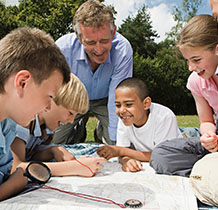Resource Database

Click on a topic or use the search box below to look for a listing:
There are 488 resources. Displaying 10 resources per page.
The National Institute on Out-of-School Time has developed a new coaching guide. The guide covers core coaching competencies: relationships, communication, principles of adult learning, professionalism, and continuous quality improvement. It also outlines effective coaching strategies. The guide can be used by both program leaders to coach their staff and by external consultants.
View Resource
Program Management
Afterschool programs can help students develop the mix of skills they need to be ready for postsecondary education and careers. For those programs that don’t have a college and career readiness program in place, the idea can seem daunting. A blog post from the American Youth Policy Forum lists five ways afterschool programs can promote college and career readiness. It also provides an overview of what this looks like in an afterschool program.
View Resource
STEM (science, technology, engineering, and mathematics) is an important and popular subject in afterschool. The archived webinar from Click2Science provides strategies on engaging families in your afterschool program’s STEM education efforts. In addition to providing a video of the webinar, Click2Science links to a staff development guide and other resources for STEM instruction and family engagement.
View Resource
The Statistics in Schools program provides high-quality and free curriculum materials for educators using Census Bureau data. New activities, designed specifically for the 2019–2020 school year, spotlight the 2020 Census and the importance of making sure everyone is counted, especially children. Activities are available for pre-K through 12th grade, English language learners, and adult English as a second language students.
View Resource
Academic Enrichment
If you are looking for ways to engage students in writing and analysis, try passion blogging, a form of writing founded on what students know and care about. An article in Edutopia describes how students can explore their interests to develop literary analysis skills. It outlines ways to help students reflect on their interests, read and write about them, and then provide feedback to peers on their writing.
View Resource
Afterschool Enrichment
Afterschool is the ideal environment to bring civics concepts like the branches of the U.S. government, the Electoral College, and trade tariffs to life. This blog post from Y4Y outlines some of the civics resources the project has available on the Y4Y site. Resources include professional development on civic learning and engagement, a citizen science course, and a service-learning toolbox.
View Resource
Academic Enrichment
The Science of Learning and Development (SoLD) Alliance explores and strengthens systems and settings that bolster whole-child efforts through research, policy, and practice. A new briefing paper from the American Institutes for Research explores SoLD in afterschool and in other systems and settings where young people learn, live, and play. The brief includes select findings from the SoLD Alliance’s efforts; key takeaways on relational settings, cultural competence, and trauma and adversity; suggestions for supporting high-quality afterschool systems and settings; and an outline of the elements of developmentally rich contexts that foster learning and healthy development.
View Resource
Academic Enrichment
The MCH Life Course Intervention Research Network and the National Academies’ Forum for Children’s Well-Being have collaborated to develop a webinar series on children’s mental health. The series identifies gaps in knowledge and explores new strategies for using existing data to enhance understanding of the developmental origins of mental disorders. It also reviews potential approaches to prevention and optimization and proposes new ways of framing how we understand, address, and prevent these disorders from a life course development perspective.
View Resource
A feeling of connectedness, or the sense of “being cared for, supported, and belonging,” can have positive outcomes for youth. They are less likely to experience negative health outcomes related to sexual risk, substance use, violence, or mental health. They are also more likely to experience positive school outcomes, such as academic achievement, high grades and test scores, better attendance, and staying in school. A new article from the Centers for Disease Control (CDC) provides an overview of adolescent connectedness and its importance. It also provides strategies to promote adolescent connectedness.
View Resource
The U.S. Department of Education’s You for Youth (Y4Y) web portal for 21st CCLC programs has a new “Click & Go” training module on trauma-informed care. The training provides background, insights, and strategies for supporting students who have experienced trauma.
View Resource
There are 488 resources. Displaying 10 items per page.
- Academic Enrichment
- Afterschool Enrichment
- Classroom Management
- College and Career Readiness
- Diverse Learners
- Family and Community Engagement
- Program Management
- Social-Emotional Learning
- Sustainability
- Technology
Subscribe to the Illinois Quality Afterschool newsletter and resource bulletin.
